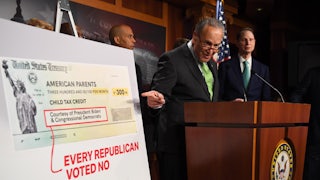Thomas Edison, the historic innovator and thinker, once said: “Our greatest weakness lies in giving up. The most certain way to succeed is always to try just one more time.”
As election night returns came in this past Tuesday, I was reflecting on this quote. When you talk about never giving up, think of Texas progressive Jessica Cisneros, who has been waging a multiyear effort to defeat anti-choice, pro-NRA, and pro-corporate congressional Democrat Henry Cuellar. Her determination is to be admired, as she has inched ever closer each time to pulling off a herculean win and now awaits the results in a race that is too close to call. Cisneros engineered strong grassroots support, earned the backing of labor, and attracted enough of a war chest to wage a powerful underdog effort.
Her fight needs to inspire many, many others nationwide. We urgently need to recruit populist candidates who are eager to improve the struggling brand and identity of Democrats, so that we can return to making compelling and persuasive appeals to the multiracial working class of today.
The progressive push must be focused on redefining Democrats’ historical class-based appeal, to reaffirm President Truman’s declaration in 1948: “Victory has become a habit of our Party.… The reason is that the people know that the Democratic Party is the people’s party, and the Republican Party is the party of special interest, and it always has been and always will be.” Are we a people’s party or a corporate party? A very clarifying question worth the inquiry.
There have been rays of light in this election cycle toward the direction of a people’s party, offered by a few candidates willing to buck establishment status quo–ism and carve a renewed Democratic brand of populism. In Oregon, Jamie McLeod-Skinner successfully raised the issues of corporate accountability in her race and unabashedly took the fight to Pharma-backed incumbent Kurt Schrader. And of course, in Pennsylvania both John Fetterman and Summer Lee were carried to victory with the support of ordinary people, and both had to overcome structural opposition from their own party.
Consider that no one in the Pennsylvania legislature came out publicly for Fetterman before his victory. Billed as a “different kind of Democrat” on his own website, Fetterman rode his working-class image and agenda to great success against insider-favorite Conor Lamb. Fetterman rolled up big margins in white working-class areas of Pennsylvania, suggesting a successful path for populist Democrats willing to challenge their own party’s brand weakness among rural voters.
There are plenty of opportunities for working-class, populist Democrats to wage the necessary battles to redefine the brand. But unfortunately, we’re not showing up to some of those fights quite yet.
On Tuesday, Republicans had their eyes focused on Arkansas and Alabama Senate primaries to see whether insurgent candidates could disrupt party favorites. (They did not.)
In my view, these solidly red states provide fertile ground for populist Democratic challengers who are willing to run against the party establishment and in favor of strong working-class appeals. In 2020 in Kentucky, Charles Booker took on his own party’s favored candidate, Amy McGrath, in the Senate primary and almost won. Today, due to his resilience, he is the party’s nominee to take on Rand Paul in November.
Consider Alabama. A state that has witnessed two campaigns to unionize Amazon in the past couple of years and has seen a brutal union-busting effort by the Warrior Met Coal company against its own workers. These worker-led movements have popular support in the state. Alabamians are hungry for someone to speak to their pain, carry their fight in the political area, and importantly, take on a struggle that necessarily entails friction with their wealthy corporate paymasters. Due to GOP Senator Richard Shelby’s retirement, there is an open seat. This should be fertile ground for redefinition of the Democratic brand. And while the contest might not be immediately successful, waging this kind of battle is necessary for repositioning the party to potentially win down-ballot seats or even claim a Senate victory in the years to come.
The alternative is to simply give up. But it wasn’t that long ago when Democrats—buffeted by FDR/New Deal branding and the molding of generations of Democratic voters—held Senate seats in places like Alabama, Arkansas, Indiana, North Dakota, and Louisiana, all of which have races this year. It’s just like Edison said: “The most certain way to succeed is always to try just one more time.”
There is a positive example of someone showcasing this mentality. Lucas Kunce, a Marine veteran of the Iraq and Afghanistan wars, is running an unapologetically populist, anti-corporate campaign for Senate in Missouri. Recently, he called for the prosecution of anyone at Abbott Labs who participated in what he called the “corporate manslaughter” resulting from the baby formula crisis. Naturally, he is being opposed by a self-funded corporate executive who has little chance of generating any grassroots support. Should Kunce win the nomination, it will be a compelling race to watch because he is invested in retooling how the Democratic brand is received by voters.
Not only do I want to see Democrats wage 50 state campaigns to win, I also want to see the party try to wage many of these very hard-to-win fights in red states. They serve as potential great laboratories for retooling Democrats’ struggles with working-class appeals. But it’s going to take candidates willing to challenge their own party’s orthodoxies to step into the arena and offer the direction consistent with an approach of a people’s party. And it’s going to take an outside-the-party infrastructure willing to support them.








